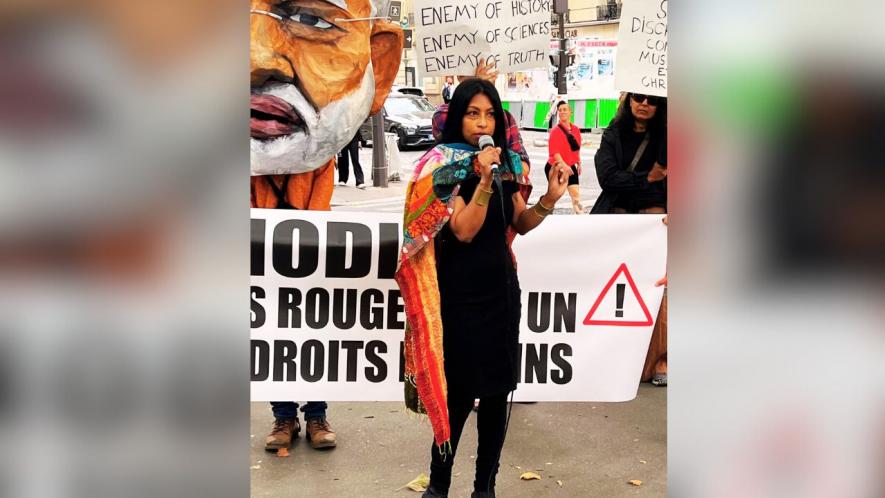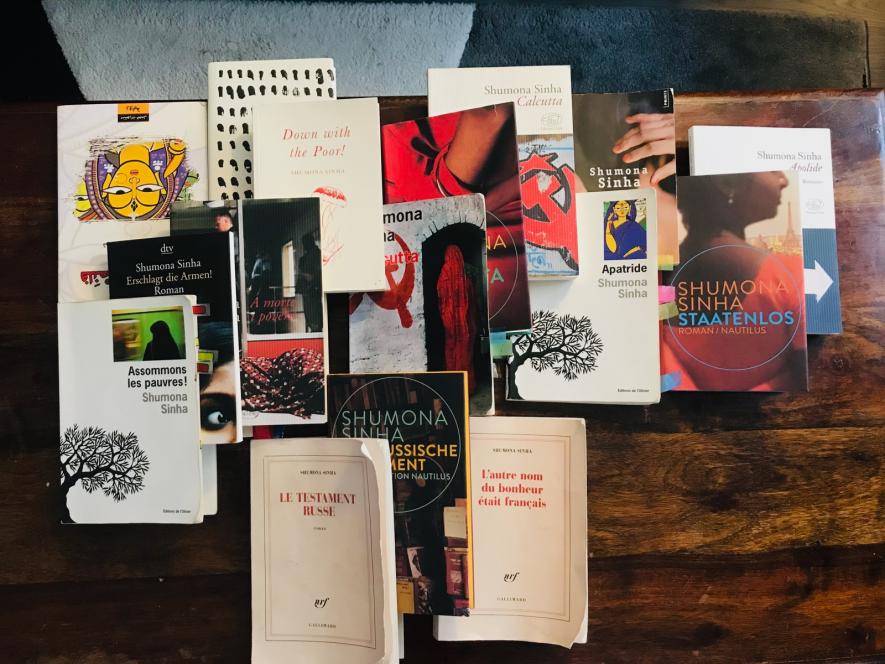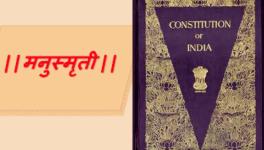I Came to Literature not only to Cross Boundaries, but to see Them Disappear: Shumona Sinha

Shumona Sinha, 49, is a Franco-Indian writer, awarded by the French Academy in 2014 for her ‘brilliant contribution’ to French language and literature. She is a naturalised French citizen. In her novels, all of them with Calcutta as the backdrop, she explores questions about identity, exile, women’s condition, class conflict, multiple and non-binary identity.
Sinha’s new novel will be published on March 14, by Gallimard. It’s a road-trip in India of a young French woman, her spiritual and emotional quest, her soul-searching… It's a fictional form to expose the politics of Hindutva in current India.
Apart from her literary engagements, Sinha speaks and writes about the current situation in India in French media.
A winner of several prizes and recognition, Sinha was an English teacher in schools and high schools in the Paris region for 10 years, and also an interpreter-translator for Bangladeshi asylum seekers at the Ofpra for two and a half years. A bitter critic of the present polarised politics led by Prime Minister Narendra Modi, his party and the RSS, she believes it is badly hurting the country’s composite culture. Edited excerpts of an interview with Sandip Chakraborty, who met her in Kolkata.
Sandip Chakraborty: Tell us about your childhood, your sense of belonging in India.
Shumona Sinha: I was born and grew up in a middle-class intellectual family. My mother was a high school math teacher, my father was a professor of economics at Indian Statistical Institute and Institute of Management, member of Planning Commission, he was a Marxist, communist, theoretician of CPI(M), got almost murdered in the 1970s during the Emergency by then Congress(I) goons.
A single child, I grew up surrounded by books that my parents used to buy. We travelled across India twice a year. I wouldn’t have become the person I am, the French writer I am, if I didn’t hold Bengali language and literature in my heart so passionately since my childhood, throughout my teenage life and early youth.
For me India is a multicultural, multi-religion nation, it’s profoundly composite and complex. Anybody preaching ‘One religion. One nation' is not a true Indian.
Recently, a scholar and book critic said that I have ‘arrived’ in France, but I never left India. I think it’s a beautiful way to describe. I am Bengali, I am Indian, I am Parisian, I am French, I am European and Asian at the same time, I am from planet Earth. I don’t believe our identities to be a rigid defined thing, we are all composite and in the process of being. We are all multiple and unfinished...
SC: You have said that your home is French, please elaborate.
SS: I came to literature not only to cross boundaries, but to see them disappear. I never felt ethnic or communal solidarity. I consider myself to be a person of mixed cultural origins, a happy nomad. My home country is not India or France, it is the French language.
Regarding the fact that I write in French, we don't get to choose the language, it is the language that chooses us. And then we no longer have a choice. I live and breathe the French language. It circulates in my body like air in my lungs.
I don’t use the term “mother tongue”, we also have “father tongue”, “lovers’ tongue”, “friends’ tongue”, “political tongue” – I say native language – “langue natale” for Bengali… and French is my “vital language” – “langue vitale”, like a vital organ. All the other native languages of my previous life have fallen asleep, like underground rivers, they are not visible, and French has become a “vital language” because I can only conceive my life in that language.
To write in French is revolutionary for me, as a person who used to write in Bengali, as a teenager and a young woman. I never wrote in English. Unlike Bengali, which is a limpid language, French is rational, analytical and full of potential for linguistic inventiveness, thus writing in French shaped my thinking, and offered me the opportunity to create poetic experimentation. Linguistic and existentialist questions have become the substance for my books.

When you are an exophonic writer, you are always in a relationship of non-tranquility with the other language. This state of mind is exciting and conducive to creation.
SC: You have written six novels, what inspires you to create more? And would you like to see your work translated into Bengali, your mother language?
SS: I just want to keep on writing. India, especially Calcutta, is the backdrop of all my novels so far, and also of the next one, which will be published this March 14, by Gallimard.
My third novel, Calcutta, is a journey down the memory lane of a Bengali family, inspired by the one I had, intricately woven with the collective memory of Bengalis, of Indians, with our political history.
My fourth novel, Stateless, is a trialogue between three young Bengali women: One living in Paris, facing social, racial, religious fractures in the post-Charlie Hebdo scenario; the other, in a village near Calcutta, raped and murdered in a complicated political context in early 2000; and the third one, an orphan in Calcutta and adopted by a French couple, comes to Calcutta in search of her roots.
In my fifth novel, The Russian Testament (Gallimard, 2020), I explored the literary heritage of Calcutta, especially the passion among Bengalis for Russian literature translated into Bengali and English. The novel explores the fascination of a young Bengali girl, Tania, for a Russian Jewish editor in 1920, who was the founder publisher of Raduga Publishers.
My new novel is about a road trip in India of a young French woman, her spiritual and emotional quest, her soul-searching… It's a fictional form to expose the politics of Hindutva in current India.
My novels are translated into German, Italian, Arabic, Hungarian, and recently into English. And yes, of course, I would love to see them translated into Bengali.
SC: You have won many prizes, how special are these to you?
SS: They are a great moment of joy and happiness, of encouragement, being recognised, being compared to (Milan) Kundera and (Samuel) Beckett is awesome. I have to keep on writing. Nothing is to be taken for granted. True pleasure for me is when I am writing, it comes from finding the perfect words…
SC: What is your view of the present political scenario in India under Narendra Modi?
SS: The political ideology – that is the Hindutva agenda – of Modi, Bharatiya Janata Party (BJP), Rashtriya Swayamsevak Sangh (RSS) is dangerous. He (Modi) is a lifelong member of RSS, the mother Militia of BJP, founded in 1925 and inspired by Hitler and Mussolini. Modi and his party, political leaders like Amit Shah and Yogi Adityanath, and partisans are leading an ultra-Right Hindu nationalist xenophobic politics. They are transforming India from a secular democratic state to a theocracy, a state ruled by religious laws.
The voices of resistance are being crushed, murdered, like Gauri Lankesh (journalist) and so many others…. Criticising the Modi government is considered as a seditious act. This is outrageous!
This cult of a figure. Not only are poor, uneducated people voting for them, the multinational business tycoons, a large part of the elite and media are also supporting them. Capitalism in its state of agony needs fascism and vice-versa. That’s what is happening in India.
I see a pathological nationalist passion in so many Indians these days! It’s a pity.
SC: Do you feel secularism is at risk in India?
SS: In my third novel, Calcutta, written in 2011-2012, apart from the political situation in the 1970s, 1980s, I have written three chapters on the demolition of Babri Masjid. It’s not only that India’s secularism is at risk, I think that in different parts of India, in a fragmented way, it’s not at all secular anymore, it’s about not respecting the principle of secularism written in the Constitution any more. Modi, his party and his militia have changed India into an illiberal democracy, and are leading it to a theocracy.
SC: How do events in India affect your daily life and do these reflect in your writings?
SS: Not only in my novels, but also through my articles and open letters in French newspapers, through my interviews in French media, I am fighting, like so many others of the Indian diaspora in France, the UK, Germany, the US, against Modi and his almost fascist politics. I was part of the organisers of the protest meeting when Modi was the guest of honour in France. We had great media coverage. I wrote an open letter to French president Emmanuel Macron, stating that he had humiliated the notion of human rights and France’s dignified role as its flag holder by inviting Modi on that particular day.
I was invited to the President's palace the next week and it was ironic. Since my interviews on Modi on French TV, I received threats and insults on Twitter and on other social media for weeks.
I was invited to the Jaipur Literature Festival in the first week of February, and on that occasion, I was also invited to the Jaipur Public University. The Hindutva partisans noticed that and on Twitter, coming from different cities in India and France, they began a hate campaign, inciting the cancellation of my programme. My programme at the Jaipur Public University was cancelled. So, they have become that influential.
My programmes at the Jaipur Literature Festival were very well received. There are so many people in India across generations who are not at all comfortable with Hindu nationalist politics of Modi. There are rebellions. The term “urban Naxals”, if that’s the definition of being anti-Modi, then we are all urban Naxals, suburban Naxals, Goa-beach kinda Naxals, cross-country and overseas Naxals.
SC: You protested on foreign soil against Modi’s visit to France. Why?
SS: For all the above reasons, I consider it my duty to act and fight Modi and his party and militia. In France, I am known and respected as an author. Media and intellectuals value my judgment on India’s political situation. There are so many French journalists taking risks by exposing Modi and his Hindutva politics… We are on the same boat!
SC: In your opinion, where is India heading?
SS: If Modi stays unstoppable, then India is heading to become a theocracy, a totalitarian regime. Not only by its political structure, the outer shell, but also, the spirit of India. The minds of intellectuals, elites, students, and young ones are largely contaminated.
However, stories of resistance of people from the working classes, students and writers, artistes and journalists give us hope.
Get the latest reports & analysis with people's perspective on Protests, movements & deep analytical videos, discussions of the current affairs in your Telegram app. Subscribe to NewsClick's Telegram channel & get Real-Time updates on stories, as they get published on our website.
























